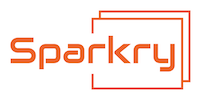At Sparkry we believe that a lot of your growth and learning can be self-directed. This list of books will help you level up in becoming a strong Tech leader.
Project Management & Agile
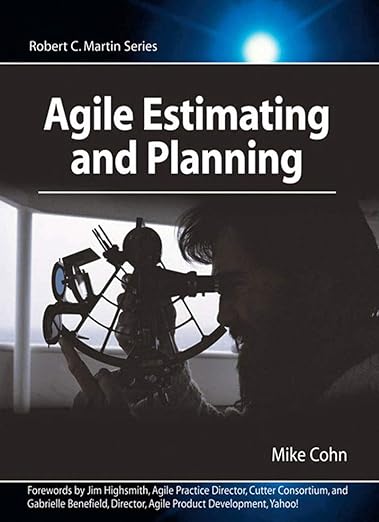
Agile Estimating and Planning
Author: Mike Cohn
This book provides a practical approach to estimating and planning in Agile environments, helping teams strike a balance between flexibility and predictability. Cohn introduces techniques like story points, velocity, and release planning to improve forecasting while embracing Agile’s iterative nature. Key insights include:
- How to create reliable estimates without excessive detail.
- Techniques for prioritizing and planning work in a way that adapts to change.
- The importance of team collaboration in improving estimation accuracy.
Why it matters for your tech career:
Effective estimation and planning are crucial for delivering software predictably while maintaining agility. Mastering these skills helps tech professionals make better commitments, manage stakeholder expectations, and contribute to high-functioning Agile teams.
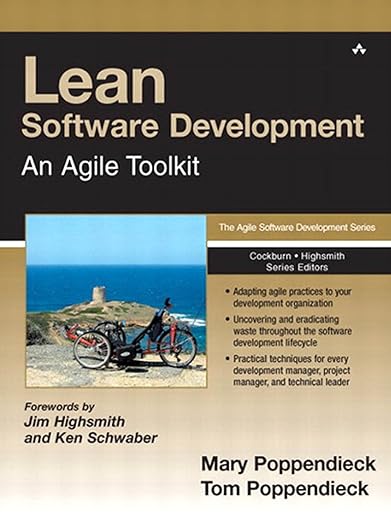
Lean Software Development: An Agile Toolkit
Authors: Mary Poppendieck & Tom Poppendieck
This book applies Lean manufacturing principles to software development, emphasizing efficiency, waste reduction, and delivering customer value. It introduces seven core principles:
- Eliminate waste – Cut unnecessary work that doesn’t add value.
- Amplify learning – Encourage continuous feedback and adaptation.
- Decide as late as possible – Avoid premature commitments and keep options open.
- Deliver as fast as possible – Shorten development cycles for quicker feedback.
- Empower the team – Trust skilled professionals to make decisions.
- Build integrity in – Ensure high quality through continuous integration and testing.
- See the whole – Optimize the system rather than focusing on isolated parts.
Why it matters for your tech career:
Lean principles help tech professionals work smarter, not harder by improving efficiency, reducing bottlenecks, and focusing on delivering real value. Whether you’re a developer, product manager, or leader, adopting Lean practices can enhance your ability to build and ship high-quality software efficiently.
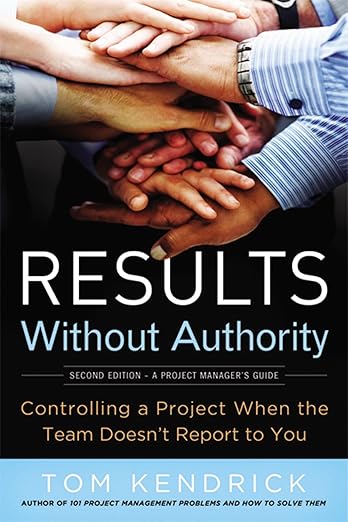
Results Without Authority: Controlling a Project When the Team Doesn’t Report to You
Author: Tom Kendrick
Managing projects in a matrixed or Agile environment often means leading without direct authority. This book provides practical strategies for influencing teams, aligning stakeholders, and driving results even when you’re not in charge. Key takeaways include:
- Building trust and credibility to gain influence.
- Managing stakeholder expectations effectively.
- Using communication and negotiation to align diverse teams.
- Applying structured problem-solving to keep projects on track.
Why it matters for your tech career:
Many tech professionals—especially project managers, product owners, and engineers—must lead without formal authority. Mastering these skills helps you navigate complex team dynamics, drive initiatives forward, and increase your impact in any organization.
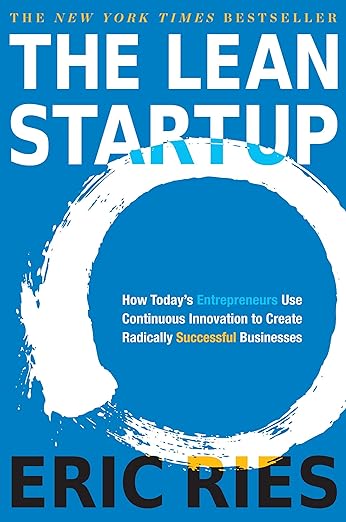
The Lean Startup: How Today’s Entrepreneurs Use Continuous Innovation to Create Radically Successful Businesses
Author: Eric Ries
This book revolutionized the way startups and tech companies build products by introducing a systematic, scientific approach to innovation. The Lean Startup methodology focuses on:
- Build-Measure-Learn – Develop a minimum viable product (MVP), test it, and iterate quickly based on feedback.
- Validated Learning – Make decisions based on real customer data, not assumptions.
- Pivot or Persevere – Know when to change direction or refine the existing idea.
- Continuous Experimentation – Use rapid iteration and small releases to optimize products and business models.
Why it matters for your tech career:
Whether you’re an entrepreneur, product manager, or developer, The Lean Startup helps you reduce risk, innovate efficiently, and create products that truly meet user needs. Mastering these principles will make you a valuable asset in any fast-moving tech environment.
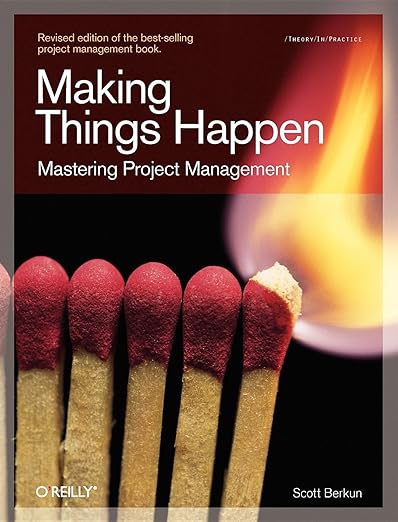
Making Things Happen: Mastering Project Management
Author: Scott Berkun
Unlike traditional project management books, Making Things Happen is based on real-world experience, offering practical advice on leading teams, managing uncertainty, and delivering results. Berkun, a former Microsoft project manager, breaks down key principles such as:
- How to make good decisions under uncertainty.
- Effective communication strategies for influencing teams and stakeholders.
- Managing risk and constraints in complex projects.
- Balancing creativity and execution to drive innovation.
Why it matters for your tech career:
This book is a must-read for tech professionals who want to lead projects successfully, navigate challenges, and inspire teams—even in high-pressure environments. Whether you’re a software engineer, product manager, or team lead, the insights will help you turn ideas into reality with confidence.
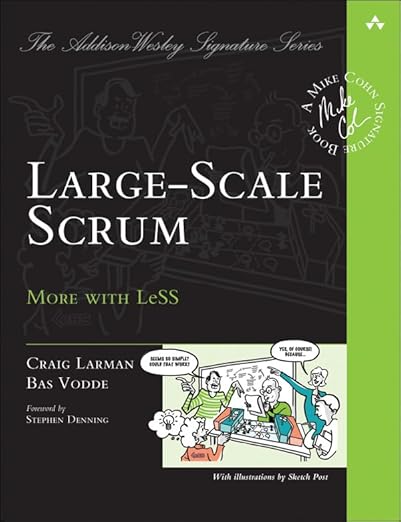
Large-Scale Scrum: More with LeSS
Authors: Craig Larman & Bas Vodde
Large-Scale Scrum (LeSS) extends Agile and Scrum principles beyond single teams to entire organizations. This book provides a practical framework for scaling Agile while maintaining flexibility, collaboration, and customer focus. Key insights include:
- Simplify, don’t add complexity—scaling should enhance, not burden teams.
- Organize around customer value, not artificial hierarchies.
- Encourage deep learning and adaptability across multiple teams.
- Use empirical process control to improve continuously based on feedback.
Why it matters for your tech career:
For tech professionals working in large organizations, understanding how to scale Agile effectively is essential. Whether you’re a Scrum Master, product owner, or engineer, this book equips you with tools to drive agility, improve collaboration, and deliver value at scale.
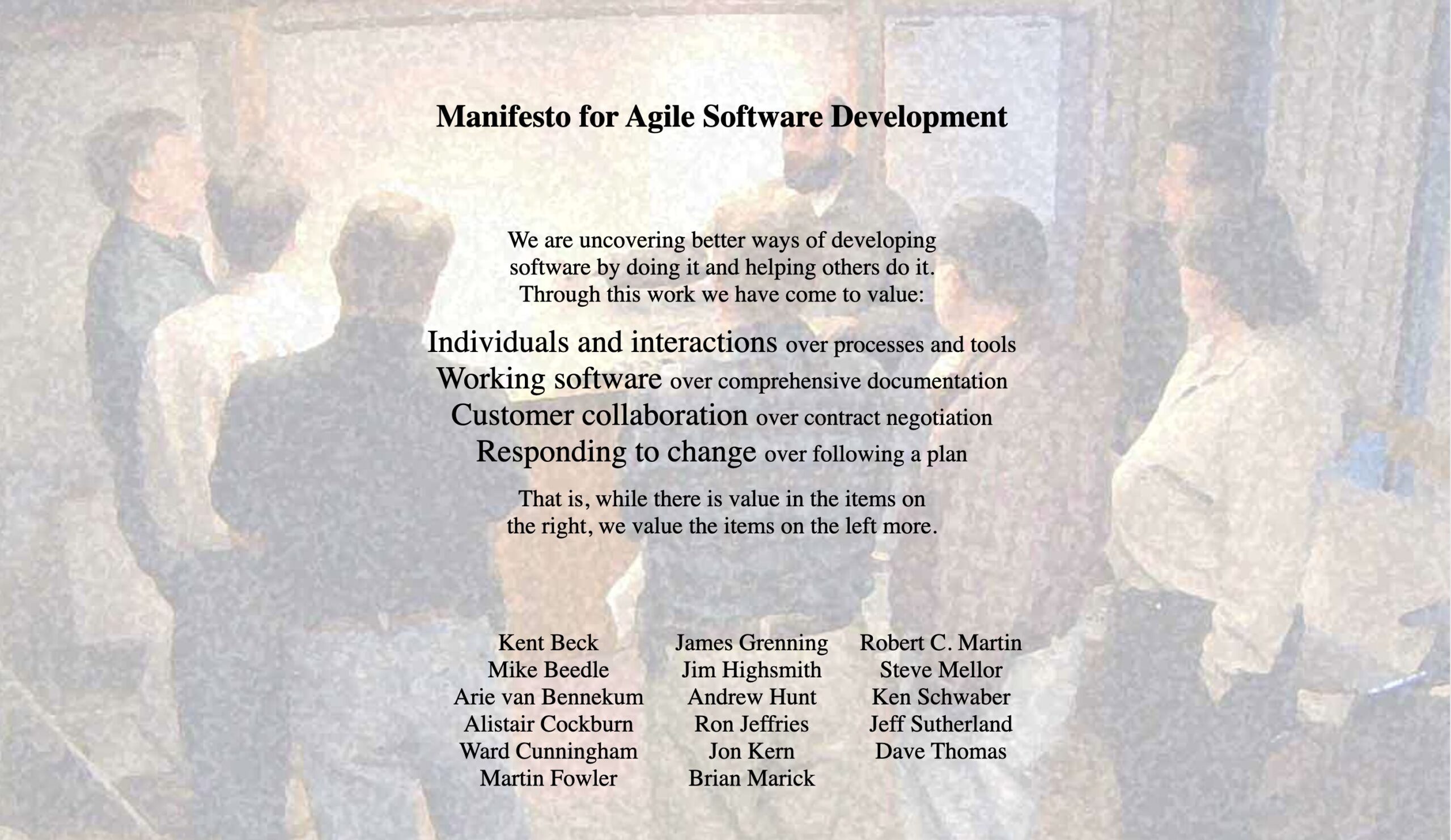
The agile manifesto
Kent Beck, Martin Fowler, Robert C. Martin, and others
The Agile Manifesto is the foundational document of Agile software development, emphasizing adaptability, collaboration, and delivering value to customers. It outlines four core values:
- Individuals and interactions over processes and tools – Agile prioritizes people and teamwork over rigid methodologies.
- Working software over comprehensive documentation – Focus on delivering functional products rather than excessive paperwork.
- Customer collaboration over contract negotiation – Engage stakeholders frequently to ensure alignment and continuous improvement.
- Responding to change over following a plan – Adaptability is key, allowing teams to pivot as needed.
Why it matters for your tech career:
Understanding Agile principles helps tech professionals work more effectively in modern software teams. It encourages flexibility, collaboration, and iterative development—essential skills for navigating fast-changing technology landscapes. Mastering Agile can make you a stronger contributor, a better leader, and more resilient in any tech environment.
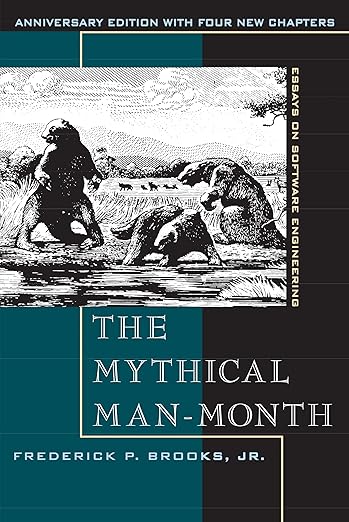
The Mythical Man-Month: Essays on Software Engineering
Author: Frederick P. Brooks Jr.
This classic book on software engineering explores the challenges of managing complex projects, with insights that remain relevant decades after its first publication. Brooks introduces key principles such as:
- “Adding manpower to a late software project makes it later.” More developers don’t always speed up progress.
- The importance of clear communication in large teams.
- The fallacy of perfect planning—software development is inherently unpredictable.
- Conceptual integrity—great software comes from unified design, not committee-driven decisions.
Why it matters for your tech career:
Understanding these timeless lessons can help you avoid common pitfalls in software development, improve project management skills, and make better strategic decisions. Whether you’re a developer, engineering manager, or product leader, this book provides deep insights into the realities of building and scaling software.uct manager, or team lead, the insights will help you turn ideas into reality with confidence.
WRITING
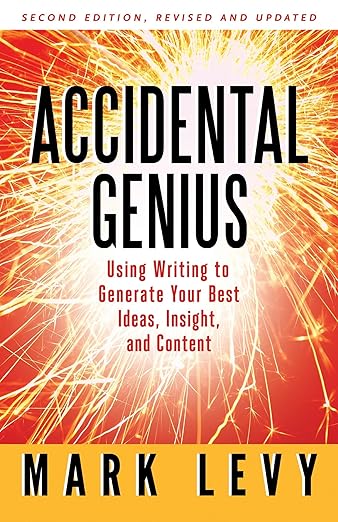
Accidental Genius: Using Writing to Generate Your Best Ideas, Insight, and Content
Author: Mark Levy
This book introduces freewriting as a powerful tool for unlocking creativity, solving problems, and generating fresh insights. Levy’s approach helps professionals overcome mental blocks and think more clearly by writing quickly and without judgment. Key takeaways include:
- Use freewriting to access deeper ideas and insights.
- Turn off your inner critic and let thoughts flow freely.
- Refine raw ideas into actionable strategies for problem-solving.
- Apply writing techniques to improve brainstorming, innovation, and decision-making.
Why it matters for your tech career:
Clear thinking leads to better solutions. Whether you’re a developer, product manager, or leader, this book helps you think more creatively, communicate effectively, and generate breakthrough ideas—essential skills for navigating the fast-changing tech world.

The Mythical Man-Month: Essays on Software Engineering
Author: Frederick P. Brooks Jr.
This classic book on software engineering explores the challenges of managing complex projects, with insights that remain relevant decades after its first publication. Brooks introduces key principles such as:
- “Adding manpower to a late software project makes it later.” More developers don’t always speed up progress.
- The importance of clear communication in large teams.
- The fallacy of perfect planning—software development is inherently unpredictable.
- Conceptual integrity—great software comes from unified design, not committee-driven decisions.
Why it matters for your tech career:
Understanding these timeless lessons can help you avoid common pitfalls in software development, improve project management skills, and make better strategic decisions. Whether you’re a developer, engineering manager, or product leader, this book provides deep insights into the realities of building and scaling software.uct manager, or team lead, the insights will help you turn ideas into reality with confidence.
Being an engineer
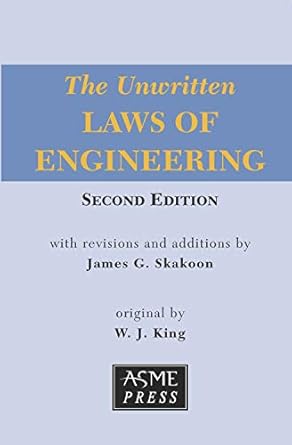
The Unwritten Laws of Engineering
Author: W. J. King (Updated by James G. Skakoon)
A collection of timeless professional wisdom, this book offers practical advice for engineers on navigating workplace dynamics, leadership, and career growth. Originally written in the 1940s, its insights remain highly relevant today. Key lessons include:
- Master the fundamentals—technical excellence is essential but not enough.
- Communicate clearly and professionally—how you present ideas matters as much as the ideas themselves.
- Understand workplace etiquette—success often depends on teamwork and relationships.
- Take initiative and responsibility—proactive problem-solving leads to career advancement.
Why it matters for your tech career:
Success in tech isn’t just about coding—it’s about collaborating, communicating, and making an impact. This book helps engineers develop the soft skills needed to thrive in any organization, from startups to large enterprises.
Note – The original version of this book has some very dated language (i.e., very male centered) but the core laws are applicable no matter the person.
management

Switch: How to Change Things When Change Is Hard
Authors: Chip Heath & Dan Heath
Switch explains why change is difficult and provides a framework for making it easier—whether at work, in organizations, or in personal life. The authors introduce the Rider, Elephant, and Path model:
- The Rider (Rational Mind) – Provide clear direction and logic to support change.
- The Elephant (Emotional Side) – Motivate and inspire people to embrace change.
- The Path (Environment & Systems) – Shape the surroundings to make change easier.
Why it matters for your tech career:
Whether you’re leading a team, driving innovation, or adapting to new technology, understanding how to influence change is a critical skill. This book helps tech professionals navigate resistance, gain buy-in, and create meaningful impact in their organizations.
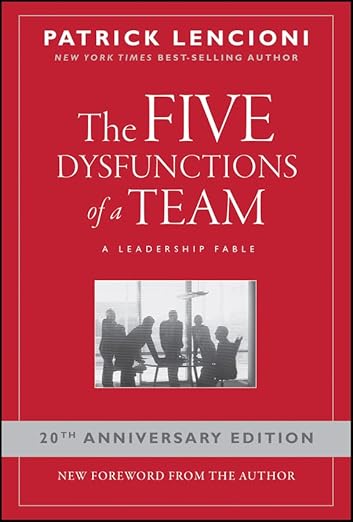
The Five Dysfunctions of a Team: A Leadership Fable
Author: Patrick Lencioni
Told as a leadership fable, this book explores the common pitfalls that prevent teams from working effectively. Lencioni identifies five key dysfunctions that can derail any group:
- Absence of Trust – Teams must be willing to be vulnerable and open.
- Fear of Conflict – Healthy debate is necessary for innovation and problem-solving.
- Lack of Commitment – Alignment and buy-in ensure everyone moves in the same direction.
- Avoidance of Accountability – Holding each other to high standards fosters growth.
- Inattention to Results – A focus on collective success is more important than personal status.
Why it matters for your tech career:
Whether you’re leading a team or working within one, understanding these dysfunctions helps you build stronger collaboration, resolve conflicts effectively, and drive better results. This book is especially valuable for tech professionals working in cross-functional or Agile teams.y, understanding how to influence change is a critical skill. This book helps tech professionals navigate resistance, gain buy-in, and create meaningful impact in their organizations.
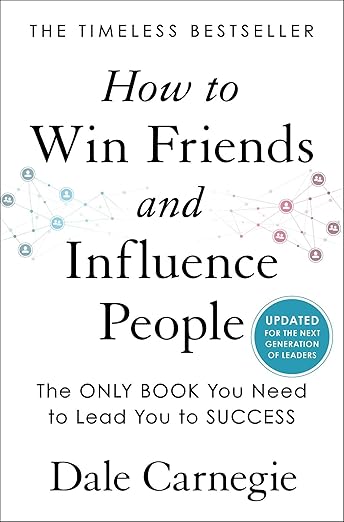
How to Win Friends and Influence People
Author: Dale Carnegie
One of the most influential self-improvement books of all time, How to Win Friends and Influence People teaches timeless principles for building relationships, earning trust, and persuading others effectively. Carnegie’s key insights include:
- Show genuine interest in others—listen more, talk less.
- Give honest and sincere appreciation—people respond well to recognition.
- Avoid criticism and complaints—constructive feedback works better.
- Encourage others to talk about themselves—people enjoy sharing their experiences.
- Make others feel important—respect and empathy create strong connections.
Why it matters for your tech career:
Success in tech isn’t just about skills—it’s about relationships, influence, and collaboration. This book helps professionals build stronger networks, communicate persuasively, and create positive workplace relationships, all essential for career growth in any industry.

12: The Elements of Great Managing
Authors: Rodd Wagner & James K. Harter
Based on Gallup’s research of over a million employees, this book identifies 12 key elements that differentiate great managers from average ones. It provides data-driven insights into what makes employees engaged and productive. Key takeaways include:
- Set clear expectations—employees thrive when they know what’s expected.
- Recognize and appreciate good work—genuine praise boosts motivation.
- Encourage professional growth—help employees develop their strengths.
- Foster a culture of trust—people perform best in a supportive environment.
- Create a sense of purpose—employees need to feel their work matters.
Why it matters for your tech career:
Whether you’re an engineering manager, tech lead, or aspiring leader, understanding what truly drives team performance can help you motivate teams, improve retention, and create a more engaged workplace. This book offers practical, research-backed strategies for managing effectively in any industry.asively, and create positive workplace relationships, all essential for career growth in any industry.
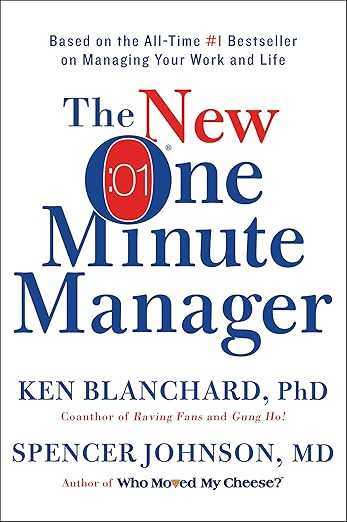
The New One Minute Manager
Authors: Ken Blanchard & Spencer Johnson
This updated classic provides a simple yet powerful approach to leadership and management. The One Minute Manager framework is based on three core techniques that boost productivity and motivation:
- One-Minute Goals – Set clear, short, and actionable goals to align expectations.
- One-Minute Praisings – Give quick, specific feedback to reinforce positive behaviors.
- One-Minute Re-Directs – Provide immediate and constructive course corrections when needed.
Why it matters for your tech career:
Whether you’re leading a team, mentoring others, or managing projects, this book teaches you how to provide clear direction, recognize achievements, and guide improvements efficiently. It’s a must-read for anyone looking to become a more effective and approachable leader in tech.
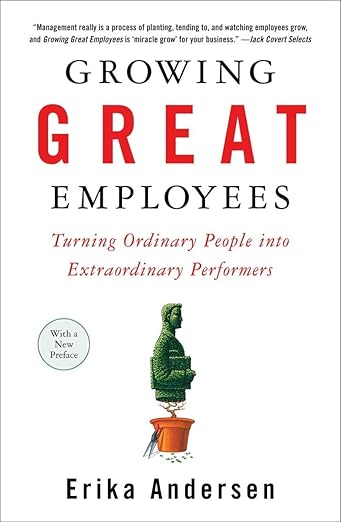
Growing Great Employees: Turning Ordinary People into Extraordinary Performers
Author: Erika Andersen
This book provides a practical, hands-on guide to developing talent, using gardening as a metaphor for leadership. Andersen shares actionable strategies for hiring, coaching, and nurturing employees to create high-performing teams. Key takeaways include:
- Hire for potential, not just skills—find people who can grow into roles.
- Create a culture of feedback—coaching and communication drive improvement.
- Motivate employees by understanding their needs—engagement leads to productivity.
- Develop leadership at all levels—strong teams create strong businesses.
Why it matters for your tech career:
Whether you’re a manager, team lead, or aspiring leader, building and mentoring great teams is essential in the fast-moving tech world. This book equips you with the tools to recruit, retain, and develop top talent, ensuring long-term success in any organization.

Growing Great Employees: Turning Ready, Fire, Aim: Zero to $100 Million in No Time Flat
Author: Michael Masterson
This book provides a step-by-step roadmap for growing a business from startup to multimillion-dollar success. Masterson focuses on execution over perfection, breaking business growth into four key stages:
- Start-Up (0 to $1M) – Focus on selling first and refining later.
- Ramp-Up ($1M to $10M) – Build a team and scale marketing efforts.
- Expansion ($10M to $50M) – Strengthen operations and innovation.
- Maturity ($50M to $100M+) – Optimize and reinvent to sustain growth.
Why it matters for your tech career:
If you’re an entrepreneur, startup founder, or business leader, this book teaches how to scale quickly, prioritize what matters, and take action without overanalyzing. It’s essential for anyone looking to turn ideas into thriving businesses in tech or beyond.
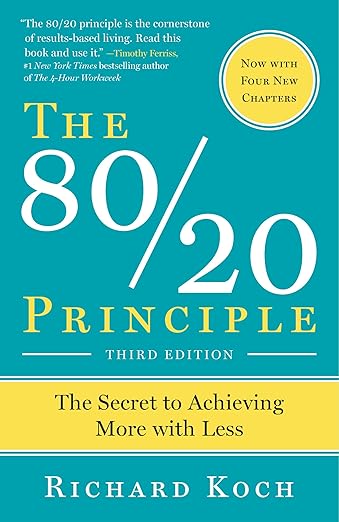
Ready, Fire, Aim: Zero to $100 Million in No Time Flat
Author: Michael Masterson
This book provides a step-by-step roadmap for growing a business from startup to multimillion-dollar success. Masterson focuses on execution over perfection, breaking business growth into four key stages:
- Start-Up (0 to $1M) – Focus on selling first and refining later.
- Ramp-Up ($1M to $10M) – Build a team and scale marketing efforts.
- Expansion ($10M to $50M) – Strengthen operations and innovation.
- Maturity ($50M to $100M+) – Optimize and reinvent to sustain growth.
Why it matters for your tech career:
If you’re an entrepreneur, startup founder, or business leader, this book teaches how to scale quickly, prioritize what matters, and take action without overanalyzing. It’s essential for anyone looking to turn ideas into thriving businesses in tech or beyond.nalyzing. It’s essential for anyone looking to turn ideas into thriving businesses in tech or beyond.
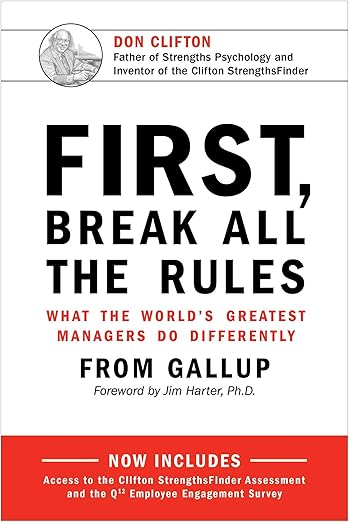
First, Break All the Rules: What the World’s Greatest Managers Do Differently
Authors: Marcus Buckingham & Curt Coffman
Based on Gallup research of over 80,000 managers, this book reveals that great leaders don’t follow conventional management wisdom. Instead, they focus on leveraging employees’ strengths and challenging traditional norms. Key takeaways include:
- Hire for talent, not just experience—skills can be taught, but natural ability is key.
- Focus on strengths, not weaknesses—help employees maximize what they do best.
- Set clear expectations and provide autonomy—trust your team to deliver results.
- Individualize motivation—what works for one employee may not work for another.
Why it matters for your tech career:
If you’re a leader, manager, or aspiring tech executive, this book teaches how to build high-performing teams by challenging outdated management practices. Understanding how to engage, motivate, and retain top talent is essential for long-term success in any tech-driven organization.
Productivity and skills improvement
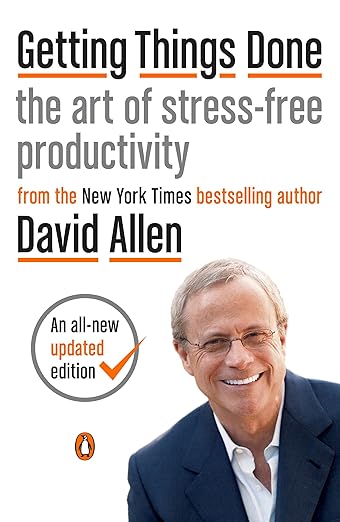
Getting Things Done: The Art of Stress-Free Productivity
Author: David Allen
David Allen’s classic introduces the GTD (Getting Things Done) methodology—a system designed to help you capture every idea, task, and commitment in one trusted place. The core process includes:
- Capture: Collect all your tasks and ideas without judgment.
- Clarify: Determine actionable next steps for each item.
- Organize: Sort tasks by context, priority, and project.
- Reflect: Regularly review your system to stay aligned with your goals.
- Engage: Focus on executing tasks based on available time and energy.
Why it matters for your tech career:
In today’s fast-paced tech environment, managing multiple projects and deadlines can be overwhelming. GTD equips you with a proven framework to reduce mental clutter, boost efficiency, and maintain focus—ensuring you can consistently deliver high-quality work while advancing your career.

The 5 A.M. Miracle: Dominate Your Day Before Breakfast
Author: Jeff Sanders
This book is a step-by-step guide to maximizing productivity by waking up early and structuring your mornings for success. Jeff Sanders introduces a morning routine designed to supercharge your day, covering strategies like:
- Waking up with purpose—set a morning ritual that jumpstarts your focus and motivation.
- Prioritizing your most important work—tackle big goals before distractions take over.
- Boosting energy levels—optimize sleep, diet, and exercise to stay productive.
- Using intentional planning—create a vision-driven daily schedule.
Why it matters for your tech career:
With endless tasks, meetings, and deadlines, starting your day with clarity and focus can be a game-changer. Whether you’re a developer, entrepreneur, or manager, adopting the 5 A.M. Miracle mindset helps you stay ahead, improve work-life balance, and achieve more in less time.nsuring you can consistently deliver high-quality work while advancing your career.
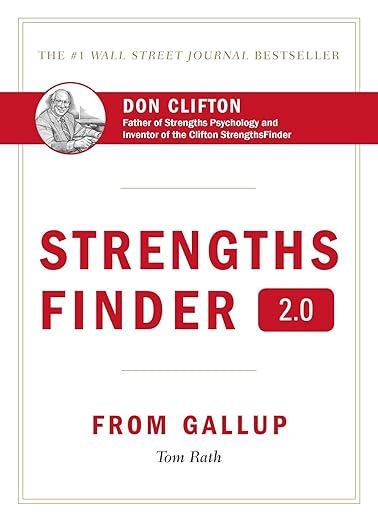
StrengthsFinder 2.0
Author: Tom Rath
Based on Gallup’s extensive research, this book helps individuals identify and develop their natural talents instead of focusing on fixing weaknesses. It introduces the CliftonStrengths assessment, which categorizes strengths into 34 talent themes such as:
- Strategic Thinking – How you analyze and solve problems.
- Relationship Building – How you connect and collaborate with others.
- Influencing – How you inspire and lead.
- Executing – How you turn ideas into action.
Why it matters for your tech career:
Understanding your strengths allows you to work more efficiently, choose the right career path, and collaborate effectively with teams. Whether you’re a developer, product manager, or leader, leveraging your strengths enhances productivity, decision-making, and overall career satisfaction.
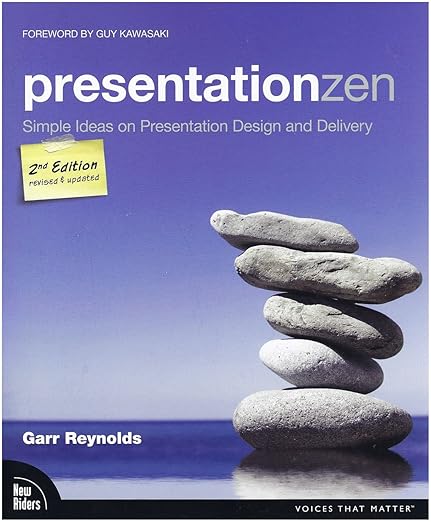
Presentation Zen: Simple Ideas on Presentation Design and Delivery
Author: Garr Reynolds
This book redefines how to create and deliver impactful presentations, emphasizing simplicity, storytelling, and strong visual design. Reynolds introduces key principles to engage audiences and communicate ideas effectively, including:
- Simplicity is key—avoid cluttered slides and focus on clarity.
- Use visuals, not bullet points—strong imagery enhances understanding.
- Tell a story—a compelling narrative makes presentations memorable.
- Practice natural delivery—speak with confidence and authenticity.
Why it matters for your tech career:
Technical professionals often struggle with presenting complex ideas in a clear and compelling way. Whether you’re pitching a product, leading a meeting, or delivering a conference talk, this book teaches you how to engage your audience, make an impact, and communicate like a pro.
Requirements, User Stories, and Testing
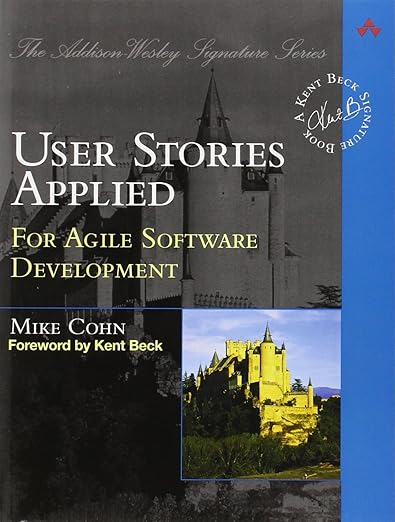
User Stories Applied: For Agile Software Development
Author: Mike Cohn
This book is a practical guide to writing and implementing user stories in Agile software development. Mike Cohn explains how well-crafted user stories improve collaboration, enhance requirements gathering, and ensure software meets customer needs. Key insights include:
- How to write clear and effective user stories—ensuring they are concise, actionable, and valuable.
- Best practices for prioritizing and estimating stories—so teams can plan work efficiently.
- Integrating user stories into the development cycle—from backlog grooming to sprint execution.
- Common pitfalls and how to avoid them—ensuring user stories drive real business value.
Why it matters for your tech career:
Mastering user stories helps developers, product managers, and Agile teams build software that truly meets customer needs. This book is essential for anyone working in Agile environments, ensuring better collaboration, clearer requirements, and more successful projects.
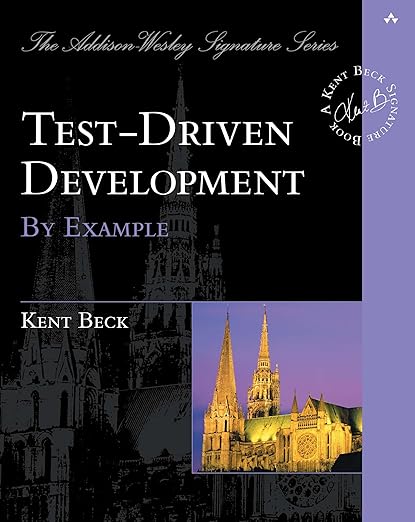
Test-Driven Development by Example
Author: Kent Beck
This book introduces Test-Driven Development (TDD), a practice that helps developers write better, more maintainable code by writing tests before implementation. Kent Beck, one of the creators of Extreme Programming (XP), walks through the TDD process with real-world examples. Key principles include:
- Write a failing test first—define what the code should do before writing it.
- Write the minimal code to pass the test—keep development focused and efficient.
- Refactor frequently—improve code quality without changing behavior.
- Continuous feedback—use tests to catch bugs early and improve confidence in changes.
Why it matters for your tech career:
TDD helps reduce bugs, improve code design, and speed up development—essential skills for any software engineer. Mastering TDD can make you a more disciplined, efficient, and highly valued developer, whether you’re working on large-scale systems or Agile projects.
Changing your thinking
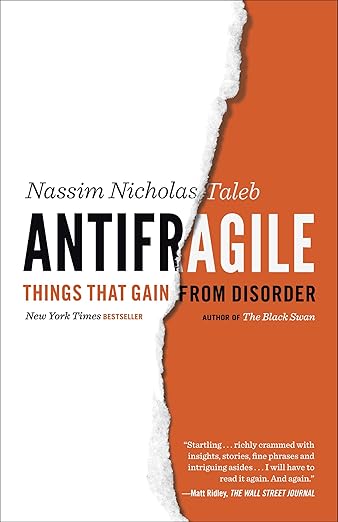
Antifragile: Things That Gain from Disorder
Author: Nassim Nicholas Taleb
In Antifragile, Nassim Taleb explores systems that not only survive uncertainty and chaos but actually grow stronger because of it. Unlike things that are fragile (which break under stress) or resilient (which withstand stress), antifragile systems improve and evolve in the face of volatility. Key insights include:
- Embrace randomness and uncertainty—stability often creates hidden risks.
- Use trial and error—small failures help prevent catastrophic mistakes.
- Decentralization leads to strength—distributed systems are harder to break.
- Avoid over-optimization—too much efficiency can create fragility.
Why it matters for your tech career:
Tech professionals operate in fast-changing environments where uncertainty is the norm. Learning to thrive amid volatility, adapt quickly, and design robust, antifragile systems is key to long-term success—whether in software, leadership, or entrepreneurship.
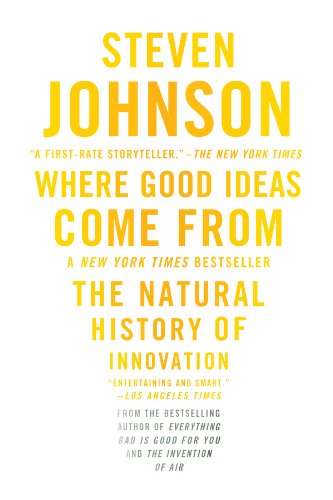
Where Good Ideas Come From: The Natural History of Innovation
Author: Steven Johnson
Steven Johnson explores the origins of breakthrough ideas, uncovering patterns of innovation across science, technology, and history. He identifies key principles that foster creativity and invention, including:
- The Adjacent Possible – Great ideas build upon existing knowledge in new ways.
- Slow Hunches – Many innovations start as vague, slow-forming insights that evolve over time.
- Serendipity & Networks – Collaboration and chance encounters spark new ideas.
- Error & Failure – Mistakes often lead to unexpected discoveries.
Why it matters for your tech career:
Innovation isn’t just about eureka moments—it’s about creating environments where ideas can grow. Whether you’re a software engineer, product manager, or entrepreneur, this book provides insights into how to cultivate creativity, solve problems, and drive groundbreaking innovation in tech and beyond.

Quiet: The Power of Introverts in a World That Can’t Stop Talking
Author: Susan Cain
Susan Cain’s Quiet challenges the societal bias toward extroversion and highlights the unique strengths and contributions of introverts. Drawing from research in psychology and neuroscience, she explains how introverts excel in leadership, creativity, and problem-solving. Key insights include:
- Introverts thrive in deep work – Solitude enhances creativity and focus.
- Listening is a superpower – Thoughtful, quiet leaders can be just as influential as loud ones.
- The “Extrovert Ideal” is overrated – Many of history’s greatest minds were introverts.
- Success isn’t about being loud, but being authentic – Knowing your strengths leads to greater impact.
Why it matters for your tech career:
Many roles in tech favor deep thinking, problem-solving, and focus, making it a great field for introverts. This book helps introverted professionals embrace their natural strengths, navigate team dynamics, and succeed in a world that often rewards extroversion.
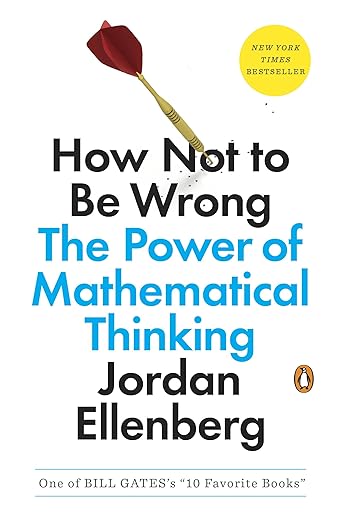
How Not to Be Wrong: The Power of Mathematical Thinking
Author: Jordan Ellenberg
This book demystifies mathematics, showing how it influences everyday life, decision-making, and problem-solving. Jordan Ellenberg argues that math is more than formulas—it’s a way of thinking that helps us make better choices. Key insights include:
- Avoiding common logical fallacies – Numbers can be misleading if not interpreted correctly.
- Recognizing hidden biases in data – Math helps cut through misinformation.
- Understanding probability and risk – Critical for decision-making in uncertain situations.
- Using mathematical thinking to solve real-world problems – From politics to business strategy.
Why it matters for your tech career:
In tech, data-driven decisions are crucial. Whether you’re a software engineer, product manager, or entrepreneur, this book helps you think more critically, interpret statistics wisely, and avoid faulty reasoning, making you a sharper, more effective problem-solver.
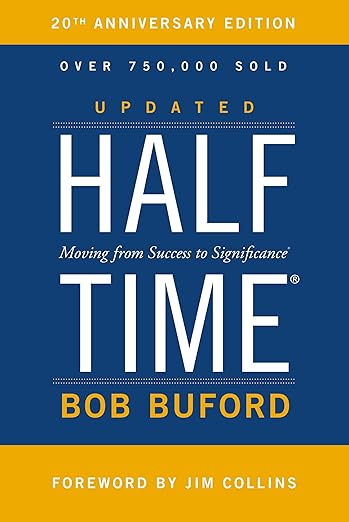
Halftime: Moving from Success to Significance
Author: Bob Buford
This book explores how to transition from a career focused on success to one driven by meaning and impact. Bob Buford introduces the concept of “Halftime”, a period of reflection and reinvention for mid-career professionals seeking a more fulfilling second act. Key insights include:
- Redefining success – Moving from wealth and achievement to purpose and contribution.
- Finding your calling – Discovering what truly energizes and inspires you.
- Leveraging your experience – Using past accomplishments to fuel a meaningful future.
- Balancing work, family, and impact – Creating a life that aligns with your values.
Why it matters for your tech career:
For tech professionals reevaluating their career path, this book provides guidance on how to pivot toward work that is both fulfilling and impactful. Whether you’re considering a leadership role, entrepreneurship, or a passion project, Halftime helps you design a second act that matters.
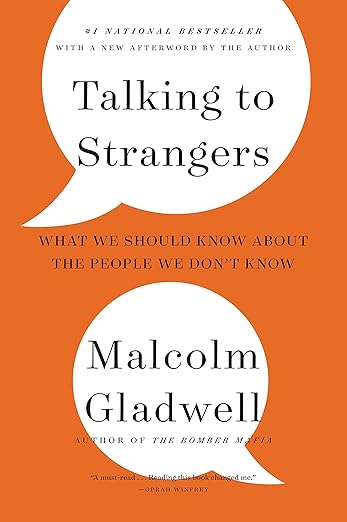
Talking to Strangers: What We Should Know About the People We Don’t Know
Author: Malcolm Gladwell
In Talking to Strangers, Malcolm Gladwell examines why we often misunderstand people we don’t know—and how these misinterpretations lead to misjudgments, conflicts, and even disasters. Using real-world cases, he explores how our assumptions about others can be dangerously flawed. Key insights include:
- The illusion of transparency – We assume we understand others better than we actually do.
- The problem with defaulting to truth – People naturally trust others, even when deception is present.
- How context shapes interactions – Behavior is deeply influenced by situations, not just personality.
- The consequences of miscommunication – From wrongful convictions to diplomatic failures, misunderstanding strangers has serious repercussions.
Why it matters for your tech career:
In tech, strong communication and trust-building are essential for working across teams, managing stakeholders, and leading effectively. This book helps professionals navigate complex social interactions, improve negotiation skills, and foster better collaboration in diverse environments.rship, or a passion project, Halftime helps you design a second act that matters.
